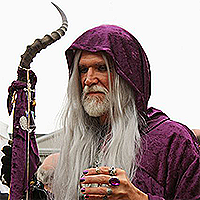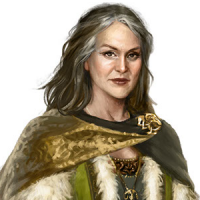Boljovan Personalities
Oratores: Those Who Pray
Albin of MinosBishop of the Diocese of the Cockerel in Boljova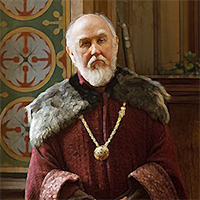 Original article: Albin Lyubka
Bishop Albin was born the fifth son of the prodigious Maxmilián IV "The High Hammer" of House Lyubka, Voievod of Boljova in 1290 IC. Albin proved to be a studious young man who had very little patience for the more boisterous past-times of his more martial brothers. He had a mind for mathematics and accounting and was more often found with his tutor from the Church of Minos than anyone else in his family. At the age of 13, he entered the priesthood of Minos as a Flamen of Minos. Albin's early career was somewhat unremarkable: he tended to be more secular than spiritual in his approach to the Church and the few who remained faithful during the Dark Times. In 1312 IC, when the Old Gods returned to the world, Albin discovered he was capable of channeling Divine magic and was called by Minos the Cockerel to continue to serve the Church. With his faith in Minos reinforced, Albin became deeply spiritual himself and worked hard to help reorganize the faltering Church in Dracia. In 1334 IC, Albin became Bishop of the Diocese of the Cockerel in Boljova, becoming one of the chief spiritual advisers to his brother, the Voievod Ljupcho of House Lyubka. Albin is known for being sober, serious and practical, in sharp contrast to his brother and, indeed, for most of House Lyubka. He is fluent or at least familiar in a dozen different languages and often serves as a translator for visiting dignitaries, both for his brother and periodically for the Queen of Dracia in Kzerna. Recently, he joined his brother on the front lines in Dracia's defense of Waldavia against Murgosia where served ably both as a spiritual leader among the troops and managing logistics for the force. |
Clemen of TempusArchbishop of Northern Aurea for Tempus the Hoarbeard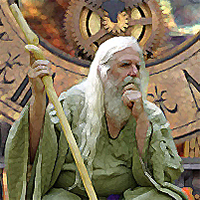 |
Dominik of BaelthorBishop of the Diocese of the Stonehands in Moldogoi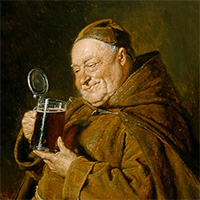 Original article: Dominik Lyubka
The venerable and beloved Bishop Dominik of Baelthor was born the third son of the Voievod of Boljova, Aleksandar II, in the early years of the Dark Times. As with many Dracian nobles of the time not standing to inherit, Dominik studied to become a brewer and founded a brewery in Moremia. He worked to organize brewers in Moremia and beyond through the chaos of the Dark Times, gaining a reputation among Dracians as more interested in fellowship than profit (to which he retorted they were one and the same). He was well on his way to becoming Master of the Guild of Brewers in Moremia when the Dark Times came to an abrupt end in 1312 IC and Dominik was called to the Church of Baelthor. At the age of 40, he entered the priesthood as an Acolyte and become a Clericus by the age of 50. During this time, he traveled extensively throughout Dracia, becoming involved not only in re-organizing the tattered remains of the Church of Baelthor, but working ecumenically to restore the priesthoods of the Old Gods (particularly the Churches of the Ilum Balthoran). In 1331 IC, Dominik was chosen as Bishop of the Diocese of the Stonehands in Moldogoi and has since worked closely with his nephew, the Voievod Ljupcho of House Lyubka. Though now advanced in age and often seeming to nap through Council meetings with his nephew, Dominik remains a wise and honest advisor to the Voievod, one of the few who can quickly quell the legendary crudeness of his nephew and put him in his place with a few sleepy reminders of his duty to family and his people. |
Ljubomir of MulciberBishop of the Diocese of the Forgemaster in Western Dracia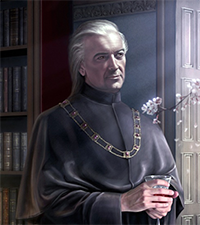 Original article: Ljubomir Neculai
Ljubomir of House Neculai was born the bastard child of Markéta, sister to the current Bȃn of Belavnik, Radomir. At a young age went the way of many young Dracian nobles who did not stand to inherit and apprenticed to become a smith, specializing in crafting arms and armor. At the age of fourteen, it was discovered that Ljubomir not only had no small talent with Enchanting, but was also capable of channeling Divine Magic. At the direction of his family, he became an Acolyte of the Church of Mulciber the Forgemaster, god of smithing and proved not only to be a talented craftsman, but was quick to make personal and political alliances as he rose through the ranks of the priesthood. Initially a clericus of the Church of the Forgemaster, Ljubomir entered work for the Dracian Royal Army at the age of 28 and served for two decades, eventually becoming Engineer Prefect for the White Eagles, the Kings's personal military regiment, in 1330 IC. He continued to serve in the same capacity when Queen Magdalena reformed the White Eagles as the Ivory Guard in 1346 IC. Five years ago, in 1349 IC, Ljubomir retired from military life and made the transition to Flamen within the Church. He was made Bishop of the Diocese of the Forgemaster in Western Dracia and has served ably in that position ever since. Ljubomir is known to be almost obsessively clean, an unusual trait in a faith filled with craftsmen, and a hard bargainer (his mercantile opponents would call him a 'cheat'). He is known to be deeply loyal to his family and the Queen personally, though since his retirement from the Ivory Guard, he has proven himself truly faithful to the precepts of Mulciber. He is active in encouraging industry in the Dracia west of the Temesh River and often serves as a mediator between craft guilds when they find themselves in dispute. Despite his noble upbringing and reputation as a hard negotiator, Ljubomir himself is something of an aesthetic and cares little for material possessions, a trait many of his fellow Dracians find bewildering. |
Violeta of MeliboeaBishop of the Diocese of the Farseer in Western Dracia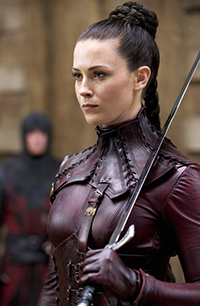 Original article: Violeta Vörös
Violeta of Meliboea was born into House Vörös, a small but ancient Dracian noble family, in 1312 IC, weeks before the end of the Dark Times and the return of the Old Gods. She was raised in [[Bistrovia|the Vojvodina of Bistrovia and entered the Church of Meliboea at a young age (some say to avoid a political marriage to an elderly member of House_Marušić). As an Acolyte of Meliboea, she became involved with a merchant's son that was apprenticed at the Temple and gave birth to a bastard son, Branimir, in 1327 IC. Despite the difficulties of balancing motherhood and her training, Violeta was a natural in combat and possessed an insight into her theological instruction that surprised her instructors. In 1331 IC, she was raised to the Order of St. Frančiška the Avenger and named Palatinus (Paladin) of Meliboea. As palatinus, she gained a reputation of being quick to action, but not rash, with an almost instinctual understanding of who was just and who was unjust. She alternately became known as an ally to the nobility of Dracia, partially because of her own noble birth, and a thorn in their side when she sensed their injustice. More than a few times, Violeta was rebuked by the Church of Minos in Dracia for acting against the mercantile interests of the Church while also being lauded for her defense of the Pokladna (Treasuries) of Minos in Boljova against human and ogre raiders. In 1348 IC, at the relatively young age of 36, Violeta became Bishop of the Diocese of the Farseer in Western Dracia. When the Boljovan Legions rose in defiance of the Dracian crown over taxation in 1353 IC, Violeta joined their movement, fighting alongside the rebels against Queen Magdalena Vtalasav and the Voievod of Boljova, Ljupcho of House Lyubka. When the rebellion was defeated, Violeta was reconciled to the secular government and pardoned by the Voivode (it is said over the private objections of the Queen herself). As part of that reconciliation, Bishop Violeta was made one of the Voievod's spiritual advisors. Though she only periodically attends to her secular political duties, she always seems to be present when a conflict is being discussed and joined the Voievod in war against Murgosia in the Dracian defense of Waldavia. The Bishop Violeta is a study in contrasts: quick-to-act but rarely rash, fiercely independent but always dutiful to her Diocese and goddess, a warrior and an advisor and a mother and a spiritual guide. Her only true constant is her passion for justice, whether that comes within the bounds of the law or without. Her allies know she can be counted on to support them when they are just, but they also know they can quickly become her foes should they act unjustly. Her son Branimir, nicknamed "The Farseer's Bastard", is an able warrior in his own right and is never far from his mother, serving officially as her Custos (Custodian). |
Bellatores: Those Who Fight
Ljupcho of House LyubkaVoievod of Boljova, Master of the Phalam Mines, Hammer of the Boltjovan Legions, Aparator of House Lyubka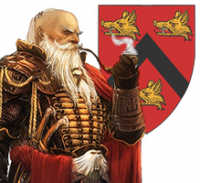 Original article: Ljupcho Lyubka
Despite his vast wealth (or perhaps because of it), Ljupcho is widely known to be as crass and crude as his fellow hillsfolk in the wild Moldogoi hills of northern Dracia. Shrewd in business as well as in war, the Voievod Ljupcho was instrumental in putting down the recent Boltjovan Rebellion. Ljupcho's sheer stubbornness and willingness to personally take the field, despite nearing his seventh decade, won both the respect of his unruly men and the Ivory Queen herself. Despite experiencing his share of setbacks in the Rebellion, he was named by the Queen "Hammer of the Boltjovan Legions". Ljupcho is loud, willful, smokes constantly and rarely completely sober, but he commands respect among his fellow nobility not only for his skill on the battlefield, but his aptitude with making coin. |
Konrad of House TemežlavPârcălab of the Comitat of Pajas Völgy, the Lone Drake Original article: Konrad Temežlav
Konrad "the Lone Drake" of House Temežlav is the recently-installed Pârcălab of Pajas Völgy. Konrad served at the side of Ljupcho of House Lyubka in defense of the Crown against the rebels of the Boljovan Legions in the recent Dracian Civil War and was raised to replace the rebellious Boris of House Zorsav upon the latter's defeat. Konrad was born in 1316 IC in Waldavian to Davorin of House Temežlav, Dracia's ambassador to Waldavia at the time. Raised primarily in Waldavia, Konrad joined the Voievod Ljupcho when he brought the Dracian armies into Waldavia to assist against the Murgosian incursion into the Duchy in 1350 IC and has served the Voievod ever since. Konrad is known to be a conscientious ruler who treated the former rebels in Pajas Völgy with an even hand, granting clemency to those who sought it after the defeat of the Boljovan Legions. Until being raised to the Comitat a year ago, he was a career soldier and has yet to wed (hence his nickname "the Lone Drake"). In recent months, several noble houses have been making overtures to the new Pârcălab in hopes of a profitable alliance. |
Tihomir of House LyubkaPârcălab of the Comitat of Moremia, Swifthammer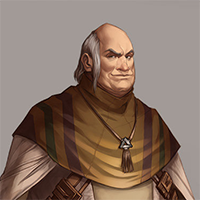 Original article: Tihomir Lyubka
Tihomir "Swifthammer" of House Lyubka was born in 1239 IC, third son to the Voivode Maxmilián IV "The High Hammer" of House Lyubka. As the third son of the Voivode, Tihomir did not stand to inherit and was apprenticed as a teamster at an early age. He eventually established his own merchant company, based in the town of Vietz, traveling extensively throughout central Aurea, making extensive mercantile contacts in Campois, Cordosia, Drussa, and Mabagne and is crediting with re-opening trade with these countries in the wake of the Dark Times. Eight years ago he abruptly ascended to the seat of the Comitat of Moremia after the death of his nephew, Ljupcho "Goldhammer." Tihomir quickly consolidated his power in Moremia and has since become even more wealthy off lucrative trade deals he's established, both for his own company and those of Moremia. Unfortunately, Tihomir's time in the public eye has spurred rumors that he is heavily involved with the criminal element of Moremia. Though well-liked by the wealthy of Moremia, his detractors claim he is self-serving and unscrupulous, paying protection money to various criminal gangs while directing them towards the caravans of his enemies and competitors. His brother and liege, the Voievod Ljupcho has been uninterested or unable to prosecute his brother for the crimes he has been accused of, siting lack of solid evidence against him. In truth, Tihomir has operated as something of a regent for his brother during the recent rebellions in Boljova and while his eldest brother fought against the Murgosian incursion in Waldavia. He earned his epithet, "Swifthammer," due to his reputation for always seeming to keep several steps ahead of his enemies. |
Vaska of House LyubkaPârcălab of the Comitat of Lybkovria, Littlehammer, Heir to Boljova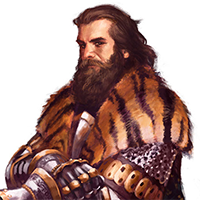 Original article: Vaska Lyubka
Vaska "Littlehammer" of House Lyubka is the eldest son of the Voievod Ljupcho and, as heir, is the Pârcălab of the Comitat of Lybkovria. Born in 1309 IC, Vaska has been trained from birth to inherit his father's Vojvodina and his nickname, "Littlehammer" is a reference to his similarity to his father (though some joke that is it also a reference to the size of his heir-maker). Vaska is known to be a patient and thrifty man who has developed close political ties to the family of his mother, House Marušić. He is rarely far from his father's side when he is at war and almost always off in his home in the town of Vrnoka when his father is in residence. Even more than most followers of Minos, Vaska is considered a personal enemy of the worshipers of Britomaris, who have attempted to assassinate the Pârcălab at least twice in the last ten years. He has served extensively with his father in military engagements both at home and abroad and is responsible for training his father's soldiers in war. As such, he is beloved by his troops and often can be found in the Mess Hall at Vrnoka, eating side-by-side with his men and recruits. Rumor suggests that when he and his men are deep in their cups, Vaska himself gets involved in some friendly brawling, though he always claims to 'forget' which of his men struck him the following day. When not at war, Vaska has gained something of a reputation on the Tourney circuit as a very able competitor, particularly on foot. Vaska does not get along with his uncle, Tihomir Lyubka, and the two have had more than a few public spats over accusations of corruption against Moremia. It is generally assumed that when Vaska is raised to Boljova he will force his uncle to retire from public life. |
Vavřinec of House LyubkaPârcălab of the Comitat of Kopca Divoký, Guardian of Northern MoldogoiOriginal article: Vavřinec Lyubka
Vavřinec is the young scion of the Lyubka Divoký (the Wild Lyubka) branch of House Lyubka and Pârcălab of Kopca Divoký. Born in 1329 IC, Vavřinec was the only son of Grigor, who fell in battle ten years ago fighting an incursion of ogres into the Comitat. Vavřinec was fifteen when he inherited and spent a year ruling under the regency of his mother, Jolanda of House Vörös, before ruling in his own right (though his mother continues to reside with her son and is one of his most trusted advisers). At the age of seventeen, Vavřinec created something of a scandal when he proposed marriage to the common daughter of his Warden, breaking a betrothal to House Zabšinac that had been established by his father. Over the objections of his family, Vavřinec did marry Anna the Maid, though the two have yet to bear a child (rumors are abound that she is barren as punishment by the gods for violating his betrothal). Vavřinec is known to be a skilled warrior and hunter, not only of the wild game common in his remote Comitat, but also of the ogres and periodic Gael raiders that range into Dracia from the Challieann Mountains. He has a reputation among his people for being both generous and humble, traits relatively uncommon among Dracians (and often considered a sign of stupidity by his countrymen). Despite the rebelliousness of his marriage, Vavřinec is known to be deeply loyal to Dracia and his cousin, the Voievod Ljupcho, and many see him as the stalwart (if slightly dim) shield of Dracia's northern frontiers. As with most nobles of the Lyubka Divoký branch, Vavřinec is a faithful worshiper of Sarpedon the Shieldsman and the Reeves in his territory tend to be both skilled and have a reputation for being entirely unbribeable. He has come into conflict with his cousin and fellow Pârcălab, the Voievod's brother Tihomir, and has accused Tihomir of organizing bandit raids against trade in the southern reaches of Kopca Divoký. Tihomir, of course, vehemently denies these claims and the Voievod seems uninterested in pursuing them. |
